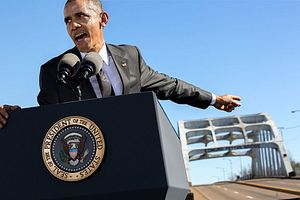The Washington Post reported on Sunday that the Obama administration was working to impose sanctions against Chinese individuals and entities involved in cyber attacks and espionage against the United States. The report comes just a couple weeks ahead of Chinese President Xi Jinping’s inaugural state visit to the United States. The sanctions represent the first use of a new executive order signed in April (I wrote about the implications of the executive order for The Diplomat at the time). That order was announced some months after the hack against Sony Pictures, which the administration claimed had been carried by agents affiliated and backed by North Korea. Sanctions against China would represent the first use of that executive order.
The Post notes that it is unclear when these sanctions would go into effect–it is entirely possible that they could come into effect before Xi’s arrival in the United States. If this were to occur, there is a risk that U.S.-China relations could be set back considerable. Economic sanctions against Chinese entities would cast a pall over an otherwise historic state visit. The implementation of these sanctions reveals quite a bit about the state of U.S.-China relations right now, and specifically about how the United States conceptualizes its national interests.
First, it’s remarkable that we’re reading about possible economic sanctions with about a fortnight left before Xi touches down at Dulles. Cyber has long been a touchy subject in U.S.-China relations. With the scale of the most recent hack against the Office of Personnel Management, which compromised sensitive personal information of millions of U.S. Federal government employees, Washington had to respond. The Obama administration knows that China will react negatively. Indeed, when the U.S. Department of Justice indicted 5 PLA officers for charges including “computer hacking, economic espionage and other offenses,” China reacted negatively. Beijing has always denied and continues to deny any charges of state-sponsored cyber espionage or hacking.
Second, there’s a domestic component to the administration’s decision as well. The Obama administration is eager to let U.S. firms know that it will take action against threats to U.S. intellectual property. Last year’s decision to indict the five PLA officers was predicated on a similar premise. In February 2015, Obama met with Silicon Valley leaders, a few months after the Sony Pictures hack, to present a cyber threat plan. Though the April executive order hadn’t been announced at the time, the administration seemed eager to let American tech firms and entrepreneurs know that it would impose costs against entities involved in the theft of U.S. intellectual property.
Third, what observers of U.S.-China relations more broadly will note, is that Washington has made a choice to push China’s buttons over the cyber espionage issue, leaving other topics, like Chinese island-building and military activities in the South China Sea, aside for now. As my colleague Shannon Tiezzi noted some weeks ago, the White House and the Department of Defense have been at odds over how best to respond to China’s irredentism and land reclamation activities: the Pentagon favors emphasizing freedom of navigation by sailing U.S. military assets within those South China Sea features (primarily, Subi and Mischief Reef) that were previously reefs and thus under the United Nations Convention of the Law of the Sea (UNCLOS) have no right to a territorial sea or exclusive economic zone.
The White House has chosen not to sail warships near China’s man-made islands thus far, but has flown surveillance aircraft in airspace near these islands. With cyber, the imposition of economic sanctions may be roughly as damaging to U.S.-China relations on aggregate as would military operations within 12 nautical miles of the South China Sea features. Washington has favored the former over the latter for now, possibly because in the South China Sea, the odds of kinetic escalation are higher.
Finally, there’s no telling how China will react to the news of economic sanctions if they’re announced before Xi’s visit. As Ashley Townshend noted recently in the Guardian, China does care about its international reputation. Announcing sanctions against Chinese individuals and entities ahead of a state visit certainly would be an embarrassment. I suspect that rather than causing Beijing to alter course on its use of cyber espionage as an instrument of national power, we may see indignant offense instead, possibly derailing productive trends in U.S.-China relations, including progress toward a bilateral investment treaty.

































